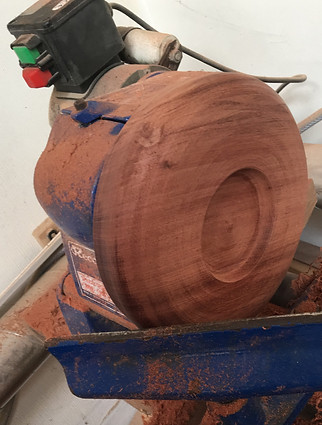Frequently Asked Questions
Who are you and why do you exist?
Fayakunu is Bradford’s first regenerative cultural studio — built to break the systemic barriers that lock too many people out of creative industries and vocational opportunities.
We exist to reconnect communities with making, enterprise, and cultural pride — bridging traditional crafts, Islamic heritage arts, and future industries under one roof.
Our full public programme launches Winter 2025.

What kinds of art does Fayakunu facilitate?
• Ceramic clay art - throwing and hand-building techniques
• Quranic Illumination Courses
• Woodworking courses, including woodturning
• Ceramic fibre and resin casting
• Jesmonite casting
• Islamic Geometry
• Asian furniture-making techniques
What else do we offer to the community?
Fayakunu provides more than workshops — we build real pathways:
-
Access to high-spec creative equipment (CNC, water jet cutter, kilns, mechanical tools)
-
Skill-building programmes for young people, artists, and makers
-
Mental wellbeing support through creative practice
-
Crowdfunding support to offer free and subsidised training
-
A cultural space reconnecting Bradford’s communities to their heritage and future industries


What are your facilities like?
Fayakunu houses one of Bradford’s most advanced creative spaces:
-
Full woodworking workshop (bandsaws, CNC router, hand tools)
-
Ceramic studio (electric wheels, kilns, hand-building stations)
-
Carbon fiber and hemp fiber casting workshop
-
Automotive restoration bays and tool stations
-
Cultural arts classroom for Islamic art, sacred geometry, and traditional crafts
Our facilities are powered by investment from the Bradford 2025 Cultural Capital Fund, enabling industry-grade making for the public.
What are Fayakunu’s aims in the community?
• Facilitate art to Bradford.
• Support the community to engage in the arts.
• Educate and celebrate ethnic art & culture.
• Support the ethnic community in reclaiming its heritage.
• Support upcoming artists to hone in on their talents.
• Support new artists from minority backgrounds to develop their craft into a social enterprise.
• Develop a unique Islamic & Ethnic hub for Art in Bradford.


Do you offer support/discounts on courses?
Yes.
We are committed to making Fayakunu as accessible as possible.
Through crowdfunding and community fundraising, we aim to provide subsidised places across our programme — especially for young people, low-income individuals, and underserved groups.
More details will be announced ahead of our Winter 2025 launch.
How is Fayakunu funded?
Fayakunu has been built through a combination of:
-
Personal Investment and Private Contributions:
In its early years (2020–2022), Fayakunu’s founder invested heavily to secure, restore, and prepare the workshop site.
-
Small Development Grants:
In 2021, Fayakunu received early support linked to Bradford’s 2025 City of Culture bid to develop initial project planning and design.
-
Bradford 2025 Cultural Capital Fund:
In 2024, Fayakunu secured major capital investment, allowing the purchase of professional-grade equipment (WAZER Water Jet Cutter, Shaper Origin CNC Router, kilns, mechanical tools) and full renovation of the space.
-
Match Funding and In-Kind Support:
Ongoing personal match-funding, volunteer support, and supplier partnerships helped bridge funding gaps and push the project forward - A special thank you to Wickes!!!
To complete our vision and expand access to free and low-cost workshops, Fayakunu is launching a community crowdfunder ahead of our Winter 2025 public opening.
Every stage of Fayakunu’s development has been fuelled by commitment, resilience, and a belief in creativity as a force for regeneration.


Can the skills learned from Fayakunu enable an artist to make a living?
Absolutely.
Fayakunu is designed to bridge creative practice with enterprise.
Through our workshops, participants gain real technical skills — in woodwork, ceramics, restoration, composites, and design — that can lead to employment, entrepreneurship, or independent artistic careers.
We aim to open real doors — not just creative expression, but creative futures.
Why is artwork important?
Artwork is not just a form of expression — it is a tool of regeneration, resilience, and cultural reclamation.
Numerous studies have documented how artistic engagement can improve cognitive function, elevate mood, and build self-esteem — particularly for those facing social or economic barriers. Beyond the individual, art serves as a powerful social device: a means of integration, healing, and community cohesion.
At Fayakunu, we have designed our programmes to intentionally bridge gaps across culture, age, and ability — reconnecting people to their creative potential and reviving cultural knowledge that has been marginalised or forgotten.

What is special about Islamic art?
Islamic art does not seek to depict the world through icons or portraits.
Instead, it reflects the divine through endless patterns — a shimmering web of geometry that mirrors the interconnectedness of all creation.
Each line, each curve, is like a thread woven into a cosmic carpet.
From close up, the work may seem chaotic — dizzying twists, sudden changes, impossible angles.
But from afar, the greater design emerges: harmonious, ordered, and whole.
Islamic art teaches that what seems broken or random in life is, in truth, part of a perfect and beautiful pattern.
There is a story that Jalaluddin Rumi tells of an ant crawling across a Persian carpet laid out in a mosque.
The ant sees only bumps, twists, and colours without meaning.
It cries out to God, confused at the futility of it all.
But the carpet-maker, looking from above, sees the pattern, the purpose, the perfection.
So it is with us.
From our small view, life’s hardships can seem senseless.
But from the view of the Divine, all is woven into beauty.
At Fayakunu, we treat Islamic art not just as design, but as a way of seeing:
a discipline of patience, unity, and trust — teaching us to find meaning in what the eye alone cannot always see.





